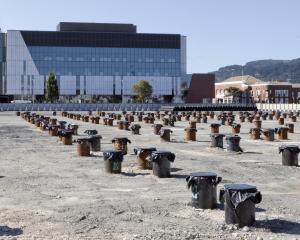While we do not know all the details, the report this week of the man who walked into a bar and left $440 for free lunches for pensioners was no joke.
Rather, to all intents and purposes, it was what we these days call a random act of kindness.
The article about what happened at the Robbies Bar and Bistro in South Dunedin made for lovely, positive reading.
The money was used, following the man's instructions, for the first 40 pensioners who came through the door for the two-course $11 meals.
Bar manager Joy Jones said the gesture came out of the blue and with the simple explanation from the man, whose name she did not know, that he just wanted to do it.
''It's nice to know there's still caring people out there in the world, where there is such a lot of hostility and non-caring people.''
Amen to that. Random acts of kindness make the world a better place.
Humans are a strange mixture, and not just comparing one with another but also within the same person.
We, as a species are capable of such caring, loving and concern and not only for family and close friends but also often for people we do not know and even for those on the other side of the world.
It seems to be in our DNA that caring for and helping others gives us a buzz, a good feeling that is at the core of happiness and fulfilment.
The saying ''it is better to give than receive'' has at its heart a psychological truth for most of us.
Even when giving means hard work, even when reluctance has to be overcome, even (or perhaps more so) when there is a significant cost in time or money to our giving it can return the highest dividend.
It is, in fact, worthwhile to think that if we have the physical means to give, that is a privilege to be shared.
It is healthy not only for the individuals concerned but also for society.
Random acts of kindness, Good Samaritan responses as well as not-so-random kindness stimulate more of the same.
They foster caring communities and more contented people.
Even a smile - to a friend or stranger - can be an act of kindness, a light in the world and perhaps just what might be needed because of someone's particular circumstances at the time.
Simultaneously, our species is capable of extraordinary cruelty, be it deliberate or accidental.
In its extreme form, and there are plenty of examples from different parts of the world, that takes the form of genocide.
There are also countless acts of selfishness and hardheartedness - large and small - at home, around the community and in workplaces.
It does not take many bullies or much meanness to poison the atmosphere and create hurt and happiness.
And it is so easy for people generally of good will, as well as those of ill will, to be caught up in negative or destructive group behaviour towards others.
All this is so unnecessary but so real.
Let us focus for now, nonetheless, on the plenitude of positives.
We read regularly on this newspaper's letters page, for example, of Otago residents helped by strangers after a fall or some other incident, of wallets full of money handed in, of thanks from grateful recipients.
Frequently, it is the oft and unfairly maligned young helping an older person, usually without any payback.
And for every incident we are aware of, there will be many, many good people doing kind and good deeds unheralded.
In a similar vein - but at a different level - was the news yesterday that New Zealand's most famous film director, Sir Peter Jackson, has dipped into his bank account to the tune of $1.06million to buy a much-loved church in Wellington, thus saving it from the wrecker's ball.
While it could be argued Sir Peter can well afford such benevolence, his gesture shows despite his world-wide success he has not lost touch with his local community, this being the second time he has saved a church from demolition in Seatoun.
New Zealand actually has a Random Acts of Kindness Day.
It even has an acronym, RAK Day, has been going for more than 10 years and is coming up soon, on September 1.
A reminder about out-of-the-blue kindness surely can only be positive.
At the same time, of course, every day should be acts of kindness day, random or otherwise.












